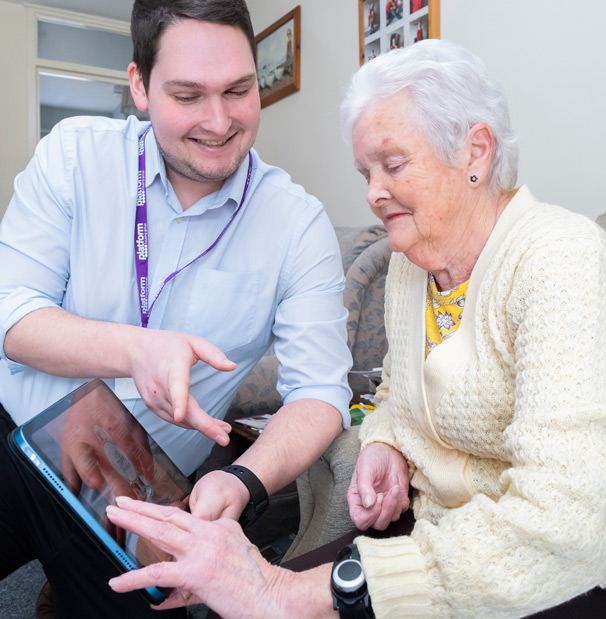Why co-produce technology enabled care?
There are some specific reasons why co-production can be an especially effective approach to developing technology enabled care for older people in later life housing.
Ownership
Tenants and staff in later life housing may not have a good understanding and knowledge of technology and low digital literacy. Therefore, they may be less open than the general population to technological solutions. By co-producing the adoption of digital technology tenants and staff will feel they have more ownership over the process. This improves the uptake and effectiveness of technology assisted care. It also builds community and encourages peer support.
As a senior citizen I do not want to be organised by others. I am an individual. I am still able to think for myself. I may be slower in thinking, in movement, in saying what I want and do not want. I do not want to be organised, to be put into a category, I do want to be included in decisions concerning me. I want to discuss what can be done for me. I want to contribute to anything concerning my life and I want to be valued for my opinions and thoughts.

Choice-led
Co-production helps ensure that the selection of technology is guided by the needs and wishes of staff, tenants and their families/friends.
Better decision making
Co-production can help avoid costly errors in which expensive technological systems are commissioned but found in practice not to be appropriate.
Co-production helps ensure that decision making is realistic and focussed on real solutions to problems in day-to-day living.
I like my Smart Speaker and use it for many things such as reminding me to take my pills. But it still couldn’t open a jar with a tight lid!

What are the benefits of co-production?
The following section summarises the benefits of co-production and based on a Social Care Institute of Excellence (opens new window) (SCIE) resource, which says that co-production can have a positive impact on people who use services and carers, on staff and results in service improvements.
Benefits for people who draw on services
Members of the public who get involved in co-production are likely to experience the following benefits:
- increased self-confidence, self-esteem, and sense of empowerment
- better health and wellbeing
- increased engagement and trust
- higher levels of satisfaction with, and awareness of, services.
Benefits for people who work in services
For staff emerging evidence suggesting their involvement results in positive outcomes, including:
- improved job satisfaction, motivation, and practice
- higher levels of trust and engagement, including involvement in future projects and dialogue with people who draw on care and support and carers.
Service improvements
There needs to be more research into the links between co-production and service improvement. However recent studies have shown that co-production can lead to:
- increased uptake of services
- decreased hospital admissions and fewer hospital visits
- positive changes in service delivery
- improvement in staff practice
Read more about the benefits of co-production (opens new window)
